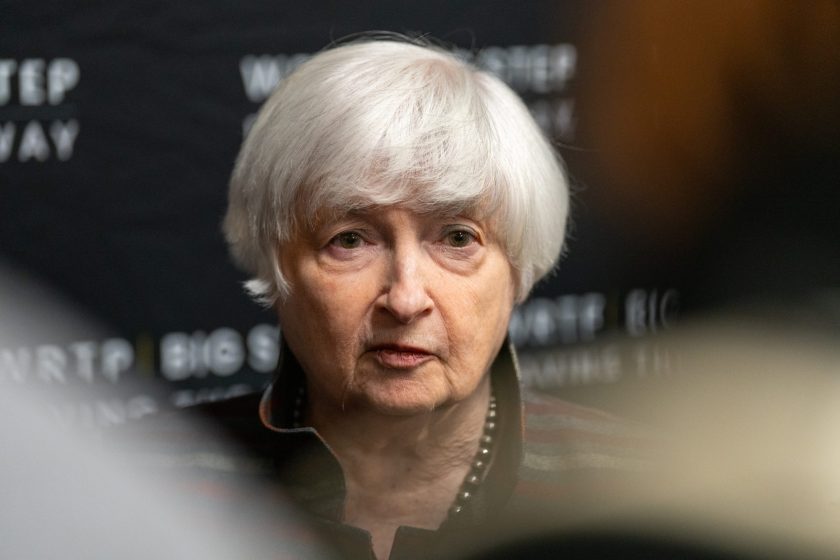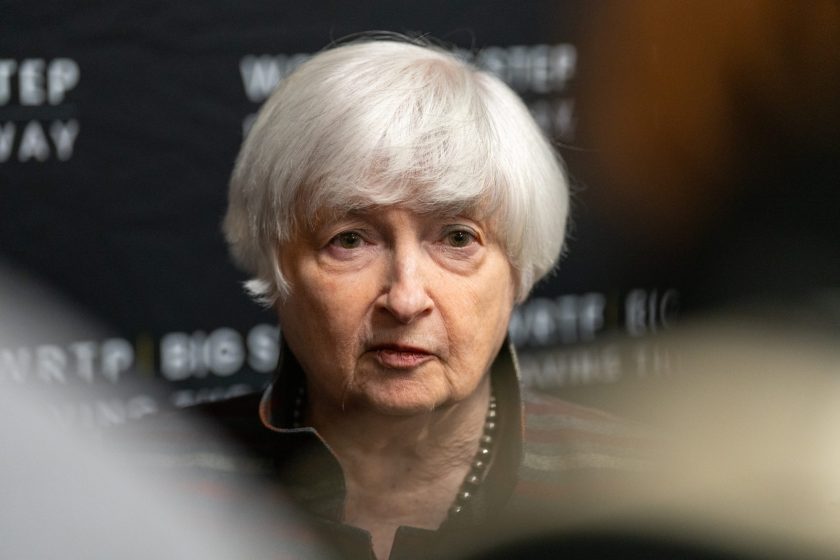
Janet Yellen, U.S. Treasury secretary, Sara Stathas—Getty Images
Proof of State is the Wednesday edition of Fortune Crypto where Leo Schwartz delivers insider insights on policy and regulation.
Convincing lawmakers to take a thoughtful approach to crypto regulation is no easy task. The collapse of FTX confirmed for skeptics that the space is filled with fraud and casino-like incentives. The Hamas attack on Oct. 7, and subsequent revelations about illicit financing using crypto, proved even more disastrous. No matter that the volumes may have been exaggerated—for some politicians, a single dollar of crypto going to Hamas or North Korea’s Lazarus Group is too much.
Recent legislation targeting money laundering and “know-your-customer” gaps in crypto reflects this approach. Every piece of technology in the broader crypto ecosystem is a nail awaiting the existing hammer of laws, like the Bank Secrecy Act, which could treat services such as wallet providers, miners, and blockchain validators as financial institutions, rather than often autonomous pieces of software.
Lawmakers, of course, are subject to political pressure. After an event like Oct. 7 and reporting about the role of crypto, they are sprung into action and forced to use legislation as a blunt instrument. The bills can be refined through new drafts and markups, and the line between press releases and policy proposals is blurred.
Regulatory agencies are in a different position. Rather than posturing about potential laws, they have to act against existing threats and work within the existing legal framework. This has generally not worked out for the crypto industry, at least in its own estimate—just look at the SEC.
When it comes to pressing concerns over illicit financing and pesky questions of how to approach the KYC and AML of crypto services, the remit has largely fallen with the Treasury Department and Justice Department. Both have taken actions detested by many in crypto, including both sanctions and criminal charges against Tornado Cash, an open-source software tool called a “mixer” that helped obscure crypto flows by organizations including Lazarus.
In late November, Treasury Deputy Secretary Wally Adeyemo stood in front of a gathered crowd of crypto policy bigwigs and shared his vision of expanding the department’s regulatory remit, which would mean classifying much of the sector as financial institutions. “Clearly what is happening now doesn’t work,” he said, putting the onus on the industry to come up with solutions.
This week, the industry answered. Three of those bigwigs—including Rebecca Rettig, the chief legal and policy officer of Polygon Labs, and Michael Mosier, a former Treasury official—released a 45-page proposal that aims to create a framework for Treasury to regulate the complex world of DeFi, or decentralized finance. Unlike centralized crypto platforms like Binance and Coinbase, many services in DeFi (like mixers such as Tornado or decentralized exchanges like Uniswap) operate as neutral software, which the authors argue makes them more akin to internet infrastructure like VPNs and other communication tools. Critically, that means they cannot be subject to the same AML and KYC obligations of financial institutions dictated by laws like the Bank Secrecy Act.
The proposal is dense and filled with acronyms that I won’t attempt to unpack in my remaining word count, but the highlights are dividing the world of DeFi services into different classifications that would be handled by different divisions of Treasury, like the Financial Crimes Enforcement Network (FinCEN) and the Office of Cybersecurity and Critical Infrastructure Protection (OCCIP). While some of the proposal would require new legislation, much could be carried out through existing rulemaking powers.
When I spoke with the authors yesterday, Mosier compared the advent of digital payments to the evolution of communication, whose advance from telegraph messages to switchboard operators to automated packet switching meant that anyone could call anyone else. “The world didn’t end and we just found other ways to manage that risk,” he said.
I asked Mosier, who was an acting director at FinCEN, whether he thought his former colleagues would engage with such a nuanced proposal, rather than take the approach that any dollar worth of crypto used as illicit finance is too much. Convincing officials that DeFi protocols should be treated as “critical infrastructure”—a designation from 1998 that means the tools are “essential to the functioning of the U.S. economy,” as the authors put it—seems like a tall task.
“You’re more likely to hear that opinion on the Hill from lawmakers,” he said. “I tend to get it much less from [Treasury] people because they’re the ones who do enforcement, and they realize that we would have shut down the entire banking system by now if the answer was zero tolerance.”
Leo Schwartz
leo.schwartz@fortune.com
@leomschwartz
DECENTRALIZED NEWS
After a federal judge accused the SEC of misleading statements in a crypto case, the agency is asking to dismiss the lawsuit. (Fortune)
Crypto investors are pouring billions of dollars into a DeFi strategy called restaking with the promise of high yields—and higher risks. (Bloomberg)
Donald Trump hosted a gala in November for holders of his NFTs, and it was just as strange as you would expect. (Rolling Stone)
Solana is spinning off a separate entity to focus on engineering amid regulatory scrutiny over whether the project is truly decentralized. (Fortune)
German police seized over $2 billion in Bitcoin related to the operation of a piracy website that violated copyright laws. (CoinDesk)
MEME O’ THE MOMENT
FTX bank run jokes never get old:
This article was originally published by a fortune.com . Read the Original article here. .

